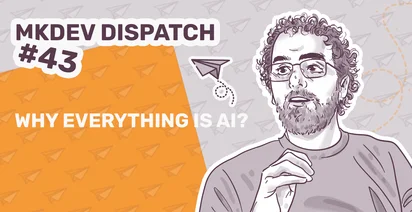Why Everything Is AI? | ✉️ #43

Hey! 👋
I have to say that I am a fan of AI, and every new development makes me dream like I did when I was a child. We can create videos from text in seconds, animate images like the photos in Harry Potter, and generate books in mere moments, even now with massive contexts of 1 million tokens—it's astounding. However, I am relieved that my plumber still uses a wrench to fix pipe issues and not an LLM to automatically generate a sink.
For that simple reason, I believe that when every cloud company presents what's new for the year, you can’t replace the wrench with an LLM. Last Next 24 was disappointing, primarily a showcase for the new LLM model, Gemini 1.5, and its integration with practically everything. Every new feature revolves around an LLM. However, we must remember that GCP is not OpenAI. The emergence of ChatGPT created panic among many companies, including Google, fearing that web search might become obsolete and questioning where to place ads. Nevertheless, as LLMs increasingly become a part of our lives, this fear spreads to every boardroom.
And what happens when fear sets in? Panic paves the way for poor decisions. Instead of improving GKE or Google Cloud, enhancing permissions in GCS, or developing something like OpenTofu in GCP, they chose to link everything to Gemini. In my opinion, it's unfortunate.
What We've Shared
On our Youtube channel Pablo joins Kirill in our effort to bring you mknews, in two new episodes of our news show:
OpenTofu vs Hashicorp, Google Cloud Next 24 Highlights, Apple ReALM beats GPT-4 / mknews 002
Best of Google Cloud Next 24 - Gemini AI, Vertex AI, GKE, New Axion Chip and others / mknews 003
DevOps Accents #35: DevOps News Selection, Real Life Automation and AI Generated Voices.
And on the website Paul Larsen, mkdev's Head of AI and Data teaches you how to scale AI across your business:
AI Strategy Guide by Paul Larsen
While Pablo asks the question: is AI really intelligent? The Generative AI Paradox
What We've Discovered
How Figma’s databases team lived to tell the scale: Details behind an 18 months journey to horizontal sharing on top of AWS RDS. The end result enables Figma more or less infinite scalability on their database level, an exciting achievement on top of the good old PostgreSQL.
We discovered an AWS access vulnerability: AWS IAM is one of the wonders of the cloud world, and it can be intimidating. Being also incredibly complex at times, it's as prone to bugs as any other software - something, that Stedi discovered recently.
Properly Running Kubernetes Jobs with Sidecars in 2024 (K8s 1.28+): It's a curious decision to implement sidecar containers as an initContainer with "restartPolicy: Always" property. Feels like a dedicated parameter would be more obvious. Kubernetes-implementation quirks aside, great small tutorial on using this new feature with Jobs!
Using the Platform Engineering Maturity Model to Understand the Commitment Required for an Internal Developer Platform: Article guides you throw the maturity model from CNCF. The problem with maturity model is that it's way too rigid and confusing, unlike capability model, that is, since a long time, a best route for organizations to improve in the space - platform engineering included.
Enforcing OPA policies with Terraform/OpenTofu in network-isolated Azure VNet: An excellent practical walkthrough of using OPA together with Terraform. Not that much Azure-specific information in the first part of the article, meaning you can apply if for any cloud setup.
A random reminder
Webinar Wednesdays are a thing: every week it's Kirill's or Pablo's turn to teach you AWS or GCP for free. We are always open to suggestions for future webinar topics, reply to any mkdev dispatch with topics you would like to see covered!
The 44th mkdev dispatch will arrive on Friday, May 10th. See you next time!
